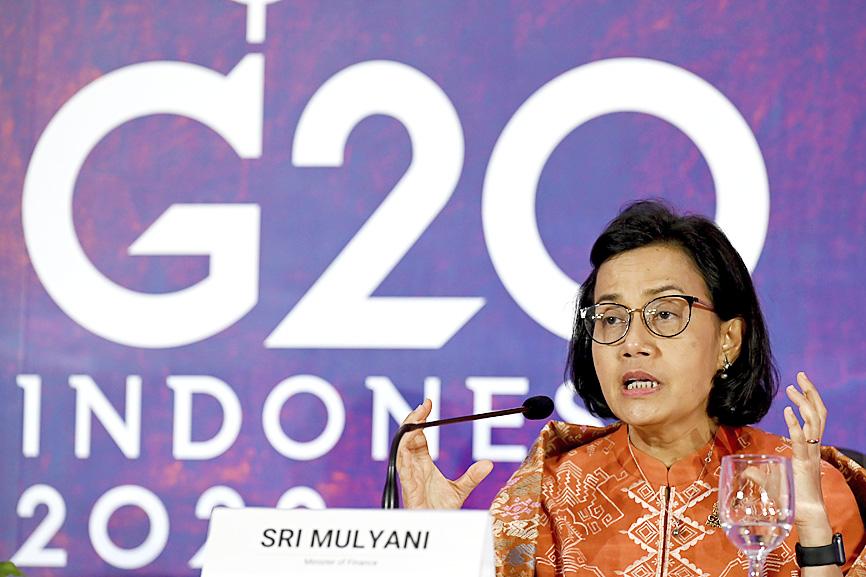Many nations in the G20 major economies condemned Russia’s invasion of Ukraine and called for it to end the war during ministerial talks in Indonesia, the host said in its closing statement early yesterday.
A two-day gathering of finance ministers and central bank governors on the resort island of Bali ended without a joint communique because of disagreements with Russia about the war.
However, Western nations pressed Russia over the military assault, accusing Moscow of sending a shockwave through the global economy and its technocrats of complicity in alleged war crimes committed during the invasion.

Photo: AP
“Many members agreed that the recovery of the global economy has slowed and is facing a major setback as a result of Russia’s war against Ukraine, which was strongly condemned, and called for an end to the war,” Indonesia said in the declaration.
Jakarta, which has been balancing its neutral foreign policy stance with hosting the G20 summit in November, replaced a joint communique with a 14-paragraph chair’s statement that did not fall under the forum’s banner and included two sections on members’ differences.
“One member expressed the view that the sanctions are adding to existing challenges,” it said, in an apparent reference to Russia, which has denied blame for the current global economic headwinds.
There was also no G20-wide consensus on the global food crisis exacerbated by Russia’s invasion, which is threatening to leave millions in developing nations at risk of hunger.
“The majority of members agreed that there is an alarming increase of food and energy insecurity,” Indonesia said. “Many members stand ready to take prompt collective actions.”
The failure to secure a joint communique came a week after Russian Minister of Foreign Affairs Sergei Lavrov walked out of G20 talks in Bali over criticism of Moscow. Russia only sent a deputy minister to the finance talks, with its finance minister participating virtually.
Canadian Minister of Finance Chrystia Freeland said her government protested at the gathering that it did not even want Russia to be there.
“Russia’s presence at this meeting was like inviting an arsonist to a meeting of firefighters,” she told a news conference by telephone from Bali.
“That is because Russia is directly and solely responsible for the illegal invasion of Ukraine, and its economic consequences, which are being felt by us all,” Freeland said.
“We were clear and explicit that Russia’s participation was inappropriate and frankly, just absurd,” said Freeland, who is also Canada’s deputy prime minister and of Ukrainian heritage.
She said that Russian technocrats who work to fund the war launched by Russian President Vladimir Putin are as complicit in war crimes as the generals out in the field who are attacking Ukraine.

The Central Election Commission has amended election and recall regulations to require elected office candidates to provide proof that they have no Chinese citizenship, a Cabinet report said. The commission on Oct. 29 last year revised the Measures for the Permission of Family-based Residence, Long-term Residence and Settlement of People from the Mainland Area in the Taiwan Area (大陸地區人民在台灣地區依親居留長期居留或定居許可辦法), the Executive Yuan said in a report it submitted to the legislature for review. The revision requires Chinese citizens applying for permanent residency to submit notarial documents showing that they have lost their Chinese household record and have renounced — or have never

A magnitude 5.6 earthquake struck off the coast of Yilan County at 12:37pm today, with clear shaking felt across much of northern Taiwan. There were no immediate reports of damage. The epicenter of the quake was 16.9km east-southeast of Yilan County Hall offshore at a depth of 66.8km, Central Weather Administration (CWA) data showed. The maximum intensity registered at a 4 in Yilan County’s Nanao Township (南澳) on Taiwan’s seven-tier scale. Other parts of Yilan, as well as certain areas of Hualien County, Taipei, New Taipei City, Taoyuan, Hsinchu County, Taichung and Miaoli County, recorded intensities of 3. Residents of Yilan County and Taipei received

Taiwan has secured another breakthrough in fruit exports, with jujubes, dragon fruit and lychees approved for shipment to the EU, the Ministry of Agriculture said yesterday. The Animal and Plant Health Inspection Agency on Thursday received formal notification of the approval from the EU, the ministry said, adding that the decision was expected to expand Taiwanese fruit producers’ access to high-end European markets. Taiwan exported 126 tonnes of lychees last year, valued at US$1.48 million, with Japan accounting for 102 tonnes. Other export destinations included New Zealand, Hong Kong, the US and Australia, ministry data showed. Jujube exports totaled 103 tonnes, valued at

BIG SPENDERS: Foreign investors bought the most Taiwan equities since 2005, signaling confidence that an AI boom would continue to benefit chipmakers Taiwan Semiconductor Manufacturing Co’s (TSMC, 台積電) market capitalization swelled to US$2 trillion for the first time following a 4.25 percent rally in its American depositary receipts (ADR) overnight, putting the world’s biggest contract chipmaker sixth on the list of the world’s biggest companies by market capitalization, just behind Amazon.com Inc. The site CompaniesMarketcap.com ranked TSMC ahead of Saudi Aramco and Meta Platforms Inc. The Taiwanese company’s ADRs on Tuesday surged to US$385.75 on the New York Stock Exchange, as strong demand for artificial intelligence (AI) applications led to chip supply constraints and boost revenue growth to record-breaking levels. Each TSMC ADR represents